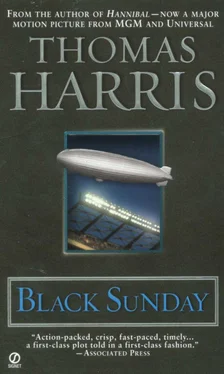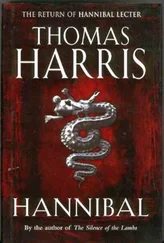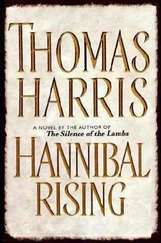“Speak English.” Lander repeated it twice before they heard him. “Who is that?”
“I can’t be positive,” Dahlia said, breathing deeply.
“I can.” Fasil held the bridge of his nose between thumb and forefinger. “It’s a filthy Israeli coward who comes in the night to kill and kill and kill, women, children… he doesn’t care. The bastard Jew killed our leader, killed many others, nearly killed Dahlia.” Unconsciously, Fasil’s hand had moved to the bullet stripe on his cheek, suffered in the Beirut raid.
Lander’s mainspring was hate, but his hate came from injury and madness. Here was conditioned hatred, and though Lander could not have defined the difference, was not consciously aware of the difference, it made him uneasy. “Maybe he’ll die,” he said.
“Oh, yes,” Fasil said. “He will.”
KABAKOV LAY AWAKE FOR HOURSin the middle of the night, after the noise of the hospital had diminished to the rustle of nylon uniforms, the squeak of soft-soled shoes on waxed doors, the toothless cry of an elderly patient down the hall calling for Jesus. He was holding on to himself as he had before, lying awake listening to the traffic in a hospital hall. Hospitals threaten us all with the old disasters of childhood, the uncontrolled bowel, the need to weep.
Kabakov did not think in terms of bravery and cowardice. When he thought about it at all, he was a behaviorist. His citations credited him with various virtues, some of which he believed to be nonexistent. The fact that his men were somewhat in awe of him was useful in leading them, but it was not a source of pride to him. Too many had died beside him.
He had seen courage. He would define it as doing what was necessary, regardless. But the operative word was necessary. Not regardless. He had known two or three men who had been utterly without fear. They were all psychotic. Fear could be controlled and channeled. It was the secret of a successful soldier.
Kabakov would laugh at the suggestion that he was an idealist, but there was inside him a dichotomy that is close to the center of what is called Jewishness. He could be utterly pragmatic in his view of human behavior and still feel on the very heart of his heart the white hot fingerprint of God.
Kabakov was not a religious man as the world sees religious men. He was not learned in the rites of Judaism. But he had known that he was a Jew every day that he lived. He believed in Israel. He would do his best and leave the rest to the rabbis.
He was itching under the tape on his ribs. He found that by twisting slightly, he could make the tape pull on the itching place. It was not as satisfactory as scratching, but it helped. The doctor, young what‘s-his-name, had kept asking questions about his old scars. Kabakov laughed to himself, remembering how the doctor’s curiosity had offended Moshevsky. Moshevsky told the man Kabakov was a professional motorcycle racer. He did not tell the doctor about the fight for Mitla Pass in 1956, or the Syrian bunkers at Rafid in 1967, or the other, less conventional battlefields that had marked Kabakov—a hotel roof in Tripoli, the docks on Crete with the bullets splintering the planks—all the places where the Arab terrorists had nested.
It was the doctor’s question about old wounds that had started Kabakov thinking about Rachel. Now, lying in the dark, he thought about how it began with her.
June 9,1967: He and Moshevsky lying on stretchers outside a field hospital in Galilee, the wind blowing sand against the canvas sides with a hissing sound and the generator roaring over the moans of the wounded. A doctor, stepping high like an ibis over the litters, carrying on the awful business of triage. Kabakov and Moshevsky, both hit with small arms fire storming the Syrian Heights in darkness, were carried inside the field hospital, into the light, emergency lanterns swinging beside the operating room lamps. Numbness spreading from the needle, the masked doctor bending over him. Kabakov, watching like a stranger, not looking down at himself, mildly surprised to see that the doctor’s hands, extended for fresh sterile gloves, were the hands of a woman. Dr. Rachel Bauman, psy chiatric resident at Mt. Sinai Hospital in New York turned volunteer battlefield surgeon, removed the slug that had notched Kabakov’s collarbone.
He was recuperating in a Tel Aviv hospital when she came into his ward on a round of postoperative examinations. She was an attractive woman of about twenty-six with dark red hair gathered into a bun. Kabakov’s eyes never left her after she began her rounds with an older staff doctor and a nurse.
The nurse pulled down the sheet. Dr. Bauman did not speak to Kabakov. She was engrossed by the wound, pressing the skin around it with her fingers. The staff doctor examined it in turn.
“A very nice job, Dr. Bauman,” he said.
“Thank you, Doctor. They gave me the easier ones.”
“You did this?” Kabakov said.
She looked at him as though she had just realized he was there. “Yes.”
“You have an American accent.”
“Yes, I’m an American.”
“Thank you for coming.”
A pause, a blink, she reddened. “Thank you for breathing,” she said and walked away down the ward. Kabakov’s face showed his surprise.
“Dummy,” the older doctor said. “How would you like it if a Jew said to you ‘Thank you for acting like a Jew all day today’?” He patted Kabakov’s arm as he left the bedside.
A week later, leaving the hospital in uniform, he saw her on the front steps.
“Dr. Bauman.”
“Major Kabakov. I’m glad to see you out.” She did not smile. The wind pressed a strand of hair across her cheek.
“Have dinner with me.”
“There isn’t time, thank you. I have to go.” She disappeared into the hospital.
Kabakov was away from Tel Aviv for the next two weeks, reestablishing contact with intelligence sources along the Syrian front. He conducted one probe across the cease-fire line, moving through a moonless night to a Syrian rocket launcher position that persisted in violation of the cease-fire despite United Nations surveillance. The Russian-made rockets all detonated simultaneously in their storage racks, leaving a crater in the hillside.
When his orders brought him back to the city, he sought out some of the women he knew and found them to be as satisfactory as ever. And he persisted in his invitations to Rachel Bauman. She was helping in the operating room and working with head injury cases as much as sixteen hours a day now. Finally, wearily, smelling of disinfectant, she began to meet Kabakov near the hospital for hurried meals. She was a reserved woman and she protected herself, protected the direction of her life. Sometimes, after the last surgery of the evening, they sat on a park bench and sipped brandy from a flask. She was too tired for much conversation, but she drew comfort from sitting beside the large, dark form of Kabakov. She would not come to his apartment.
This arrangement ended suddenly. They were in the park and, though Kabakov could not tell it in the darkness, she was dose to tears. A desperate four-hour operation had failed, a case of brain damage. Knowledgeable in head trauma, she had been called in to aid in the diagnosis, had confirmed the signs of subdural hematoma in a seventeen-year-old Arab soldier. The increased cerebrospinal fluid pressure and the presence of blood in the fluid left no doubt. She helped the neurosurgeon. There was an unavoidable intracerebral hemorrhage and the young man was dead. Wasted even as she watched his face.
Kabakov, laughing and unaware, told her a story about a tank driver with a scorpion in his underwear who flattened a Quonset hut. She did not respond.
“Thinking?” he said.
Читать дальше












